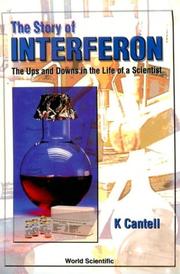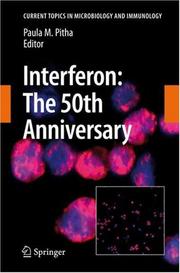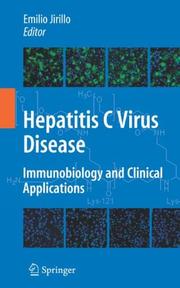| Listing 1 - 10 of 55 | << page >> |
Sort by
|
Book
Year: 2022 Publisher: London : IntechOpen,
Abstract | Keywords | Export | Availability | Bookmark
 Loading...
Loading...Choose an application
- Reference Manager
- EndNote
- RefWorks (Direct export to RefWorks)
This book discusses the significance of interferon (INF) in the clinical aspects of the disease. Chapters address the biological, chemical, and physiological aspects of IFN and how IFN can assist various targeted health interventions. The information contained herein is useful for designing IFN gamma-directed strategies for managing various diseases discussed in the text.
Interferon --- Interleukin-18. --- Immunology. --- Therapeutic use.
Book
Year: 2020 Publisher: Frontiers Media SA
Abstract | Keywords | Export | Availability | Bookmark
 Loading...
Loading...Choose an application
- Reference Manager
- EndNote
- RefWorks (Direct export to RefWorks)
This eBook is a collection of articles from a Frontiers Research Topic. Frontiers Research Topics are very popular trademarks of the Frontiers Journals Series: they are collections of at least ten articles, all centered on a particular subject. With their unique mix of varied contributions from Original Research to Review Articles, Frontiers Research Topics unify the most influential researchers, the latest key findings and historical advances in a hot research area! Find out more on how to host your own Frontiers Research Topic or contribute to one as an author by contacting the Frontiers Editorial Office: frontiersin.org/about/contact
chemokine --- CVB3 --- Hantavirus --- hcmv --- HIV --- Inflammation --- influenza --- interferon
Book
Abstract | Keywords | Export | Availability | Bookmark
 Loading...
Loading...Choose an application
- Reference Manager
- EndNote
- RefWorks (Direct export to RefWorks)
This eBook is a collection of articles from a Frontiers Research Topic. Frontiers Research Topics are very popular trademarks of the Frontiers Journals Series: they are collections of at least ten articles, all centered on a particular subject. With their unique mix of varied contributions from Original Research to Review Articles, Frontiers Research Topics unify the most influential researchers, the latest key findings and historical advances in a hot research area! Find out more on how to host your own Frontiers Research Topic or contribute to one as an author by contacting the Frontiers Editorial Office: frontiersin.org/about/contact
interferon --- type III IFNs --- barrier --- inflammation --- IFN lambda

ISBN: 1134293062 1280150777 9786610150779 0203481534 9780203481530 0415342465 9780415342469 9781134293063 9781134293018 1134293011 9781134293056 1134293054 9780415648660 0415648661 9781280150777 661015077X Year: 2005 Volume: 21 Publisher: London New York Routledge
Abstract | Keywords | Export | Availability | Bookmark
 Loading...
Loading...Choose an application
- Reference Manager
- EndNote
- RefWorks (Direct export to RefWorks)
This innovative study charts the beginnings, history and fate of Interferon - one of modern medicine's most famous and infamous drugs. Interferon is part of the medical profession's armoury against viral infection, cancer and MS. The story of its development and use is one of survival in the face of remarkable cycles of promise and disappointment as a miracle drug. By telling this story, Toine Pieters' book provides insight into the research, manufacture, and marketing of new bio-molecules that mark modern medical science. Pieters' closely argued book adopts a multi-disciplinary approach i
Interferon --- Interferon industry --- Pharmaceutical industry --- Interferons --- Antineoplastic agents --- Antiviral agents --- Glycoproteins --- Lymphokines --- History. --- Drug Industry --- Technology, Pharmaceutical --- Interférons --- therapeutic use. --- economics. --- trends. --- history. --- methods. --- History --- Histoire
Book
ISBN: 1626181128 9781626181120 Year: 2013 Publisher: New York Nova Science Publishers, Inc.
Abstract | Keywords | Export | Availability | Bookmark
 Loading...
Loading...Choose an application
- Reference Manager
- EndNote
- RefWorks (Direct export to RefWorks)
Autoimmune diseases --- Interferon --- Autoimmunologic diseases --- Autoimmunity --- Immunologic diseases --- Immunotherapy. --- Therapeutic use.

ISBN: 9812817018 9789812817013 9810231482 9789810231484 Year: 1998 Publisher: Singapore New York World Scientific
Abstract | Keywords | Export | Availability | Bookmark
 Loading...
Loading...Choose an application
- Reference Manager
- EndNote
- RefWorks (Direct export to RefWorks)
The Finnish doctor Kari Cantell is one of the scientists to whom the development of the drugs called interferons can be attributed. Interferons have achieved an important place in the treatment of cancer, viral infections and multiple sclerosis. In the 1960s Cantell and his coworkers developed a method for the preparation of interferon in white blood cells. During those years, most of the global production of interferon took place in Finland and the vast majority of the clinical studies in the world employed Finnish interferon.The memoirs of Cantell record interferon's long road from the labor
Immunologists --- Interferon --- Interferons --- Antineoplastic agents --- Antiviral agents --- Glycoproteins --- Lymphokines --- Immunology --- Medical scientists --- Biography. --- Research --- History. --- Cantell, K. --- Cantell, Kari
Periodical
ISSN: 1179139X Year: 2009 Publisher: Auckland, NZ Dove Medical Press
Abstract | Keywords | Export | Availability | Bookmark
 Loading...
Loading...Choose an application
- Reference Manager
- EndNote
- RefWorks (Direct export to RefWorks)
Interferon --- Cytokines --- Interférons --- Periodicals --- Périodiques --- Inflammation --- Interferons. --- Cytokines. --- Inflammation Mediators. --- Interferon. --- Mediators --- Mediators. --- Interferons --- Inflammatory mediators --- Mediators of inflammation --- Mediators of Inflammation --- Mediators, Inflammation --- Inflammatory process --- Antineoplastic agents --- Antiviral agents --- Glycoproteins --- Lymphokines --- Biomolecules --- Cellular immunity --- Immune response --- Inflammasomes --- Viral Interference --- Pathology --- Anti-inflammatory agents --- Regulation --- interferon --- Microbiology & Immunology --- Cytokine --- Interferó. --- Citocines. --- Inflammation Mediators --- Inflammation (Pathologie) --- Médiateurs

ISSN: 0070217X ISBN: 1281045470 9786611045470 3540713298 354071328X 3642090443 Year: 2007 Volume: 316 Publisher: Berlin : Springer,
Abstract | Keywords | Export | Availability | Bookmark
 Loading...
Loading...Choose an application
- Reference Manager
- EndNote
- RefWorks (Direct export to RefWorks)
Over the last half of century interferon (IFN), originally discovered as an antiviral protein, has developed from an inhibitor of viral replication to a major force in the antiviral response. Initially studied only by few virologists, IFN was generally considered as a poorly defined protein of limited importance. The development of molecular techniques lead to the identification of a family of IFN genes and has shown an unexpected complexity of type I IFN genes and their expression. Presently, some aspects of the of the pathogen mediated induction of IFN gene expression are understood at molecular level, while others are still at the stage of description. Both Toll like receptors and cytoplasmic RNA helicases were shown to recognize viral nucleic acids and the basis of a distinct recognition of viral nucleic acids from the cellular ones are emerging. Important insights on the virus recognition entity, leading to the expression of interferon and interferon induced genes, have been made in the recent year, which are challenging the accepted concept of the critical role of dsRNA in IFN induction. The availability of genetically modified mice that are lacking either essential components of the interferon inducing pathway, or interferon signaling pathway fully confirmed the original idea, made soon after its discovery, that interferon is the first cellular defense against viral infection.
Interferon. --- Interferons --- Antineoplastic agents --- Antiviral agents --- Glycoproteins --- Lymphokines --- Immunology. --- Medical virology. --- Virology. --- Medical microbiology --- Virology --- Virus diseases --- Immunobiology --- Life sciences --- Serology --- Microbiology
Book
ISBN: 9789811024160 Year: 2017 Publisher: Singapore : Springer Singapore : Imprint: Springer,
Abstract | Keywords | Export | Availability | Bookmark
 Loading...
Loading...Choose an application
- Reference Manager
- EndNote
- RefWorks (Direct export to RefWorks)
This book introduces readers to Direct Acting Antiviral (DAAs) agents, newly developed drugs to treat chronic hepatitis C virus infection, which have an excellent anti-viral effect on virus replication. These drugs have been developed to enhance the effect of interferon and ribavirin, as the resistant strains against each drug have been described both in vitro and in vivo and the existences of naturally occurring variants have been reported. However, since the combination of different classes of DAAs is sufficient to completely eradicate the virus without the need for interferon or ribavirin, the current treatment regimen does not include interferon. Ribavirin is used in combination with sofosbuvir, a potent polymerase inhibitor, to enhance its antiviral effects. Hepatitis C Virus Treatment offers readers a comprehensive guide to hepatitis C; describing the resistance profiles against these drugs and shedding light on the difficulties involved in DAA therapy and the direction of future treatments, it will equip doctors to understand the essentials of treating the disease. It also describes in detail new and innovative DAA treatments, the effects of the agents, and the characteristics of resistance, providing cutting-edge information not only for hepatologists, but also for researchers, clinical residents, and medical students.
Pharmacology. Therapy --- Medical microbiology, virology, parasitology --- Gastroenterology --- Human medicine --- resistentie (farmacologie) --- geneesmiddelentolerantie --- medische virologie --- farmacologie --- geneeskunde --- virologie --- gastro-enterologie --- leverziekten --- hepatitis C --- drugs --- interferon --- polymeren --- Hepatology. --- Virology. --- Drug resistance. --- Drug Resistance. --- Resistance to drugs --- Pharmacology --- Microbiology

ISBN: 1281138894 9786611138899 038771376X 0387713751 1441924388 Year: 2008 Publisher: New York ; London : Springer,
Abstract | Keywords | Export | Availability | Bookmark
 Loading...
Loading...Choose an application
- Reference Manager
- EndNote
- RefWorks (Direct export to RefWorks)
This comprehensive volume, written by experts in the field, emphasizes the most recent advances on the Hepatitis C virus infection (HCV) moving from basic research to clinical application. In spite of the numerous studies on HCV infection, its pathogenesis and medical treatment have not been fully explained. The first chapters of this volume analyize the full spectrum of immune responses to HCV taking into account either innate or adoptive immunity involvement. The volume also includes a series of contributions which explain the state of art of IFN-alpha treatment in HCV patients and the effectiveness of therapy also in relation to HCV genotypes. The use and applications of pegylated IFNs will also be discussed as well as the complicated HCV disease and its treatment. Hepatitis C Virus Disease: Immunobiology and Clinical Applications is an ideal volume for researchers, scientists, professionals, clinicians, physicians and graduate students in the fields of infectious disease, immunology, virology, microbiology, pharmacology and medicine.
Hepatitis C --- Interferon --- Treatment. --- Therapeutic use. --- Medicine. --- Immunology. --- Virology. --- Biomedicine. --- Microbiology --- Immunobiology --- Life sciences --- Serology --- Clinical sciences --- Medical profession --- Human biology --- Medical sciences --- Pathology --- Physicians --- Hepatitis, Non-A, non-B --- Non-A, non-B hepatitis, Parenterally-transmitted --- Parenterally-transmitted non-A, non-B hepatitis --- Flaviviral diseases --- Hepatitis, Viral --- Medical virology. --- Medical microbiology --- Virology --- Virus diseases
| Listing 1 - 10 of 55 | << page >> |
Sort by
|

 Search
Search Feedback
Feedback About UniCat
About UniCat  Help
Help News
News